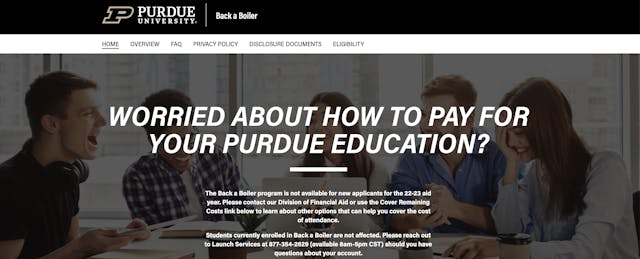Purdue University, which has championed income-share agreements as an alternative to traditional student loans, is hitting the pause button on enrollments into its Back a Boiler program.
The reason? A switch from ISA servicer Vemo Education to Launch Servicing, which won’t create new income-share agreements but will manage existing ones.
“Unlike Vemo, Launch does not provide ISA origination support functions but instead only services those agreements that have already been entered into by Purdue students,” the university said in an emailed statement to EdSurge. “After Vemo’s departure, [the Purdue Research Foundation] was not able to timely identify a suitable successor meeting PRF’s high standards for ISA origination activities in the coming academic year.”
Controversial Model
Critics are saying good riddance to the program, which was disillusioned of its talking point that it's not a loan by the Department of Education back in March, reports Inside Higher Ed.
“They’ve got their press statement about how they moved from Vemo and now Launch doesn’t do origination. Bullshit. If they wanted to find an origination partner they could,” Ben Kaufman, the Student Borrower Protection Center’s director of research and investigations, told the publication. Kaufman’s organization complained about Back a Boiler to the Education Department in March.
Under the terms of the program, students who don’t anticipate making a high salary after graduation could end up paying back less than they borrowed. But payment turned out to be a nightmare for some high-earning students, as documented by the Indianapolis Star. These students would need to fork over 250 percent of their principal if they wanted to pay it back early and walk away.
One student who borrowed $39,000 now finds himself on the hook for $900 per month to the income-share program for the next eight years, according to the Star’s report.
Andrew Hoyler, the first graduate of the Back a Boiler program, previously told EdSurge that monthly payments on his $21,000 loan have ranged from $174 to $334.
Hoyler’s advice to other students was that those likely to make higher salaries should avoid the program, while it might be better suited “for people who may not know what they want to do, or maybe plan on going into a lower-paying field for a couple of years.”
The Big Idea
Purdue University became the first major public college to offer income-share agreements in 2016 and touts the program on its website as an “an innovative new way to help make school more affordable.” It set out to compete with private loans and federal Parent PLUS loans. According to the university, nearly 1,000 Purdue students from 150 majors have used the program.
Amounts vary depending on students’ majors, but students in their sophomore year or above could borrow up to 15 percent of their expected annual income through the program. Students then pay back a percentage of their monthly salary for about 10 years, which the university’s website says would likely be more than the principal amount but could be less than what they would owe with a traditional private loan.
Plenty of other groups have tried to get in on the ISA action, too. But some entrepreneurs have grown disillusioned with the concept. One argued this spring that “the ISA experiment has failed.” And another university—the University of Utah—paused its in-house ISA program due to lack of student interest, reported the Chronicle of Higher Education.
Purdue’s income-share program could make a comeback if it finds a vendor to service origination, or create new loans, in the future, the university says in its statement to EdSurge.
“In the meantime, Purdue and PRF, like other recent observers, continue to believe ISAs provide a useful, income-dependent alternative to private and Parent PLUS loans that allow a student’s educational institution to assume some of the financial risk the student faces in an uncertain future,” it says.


